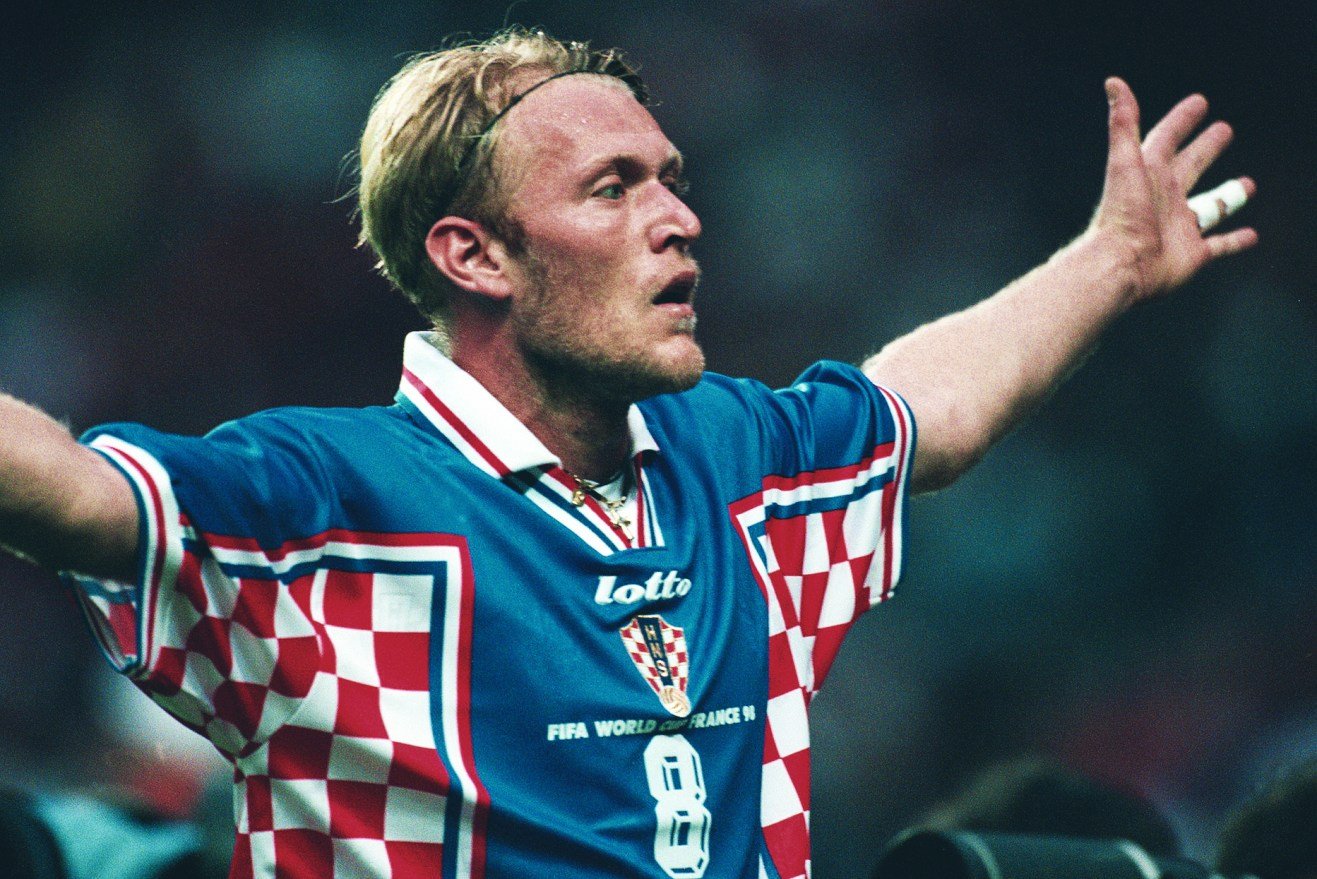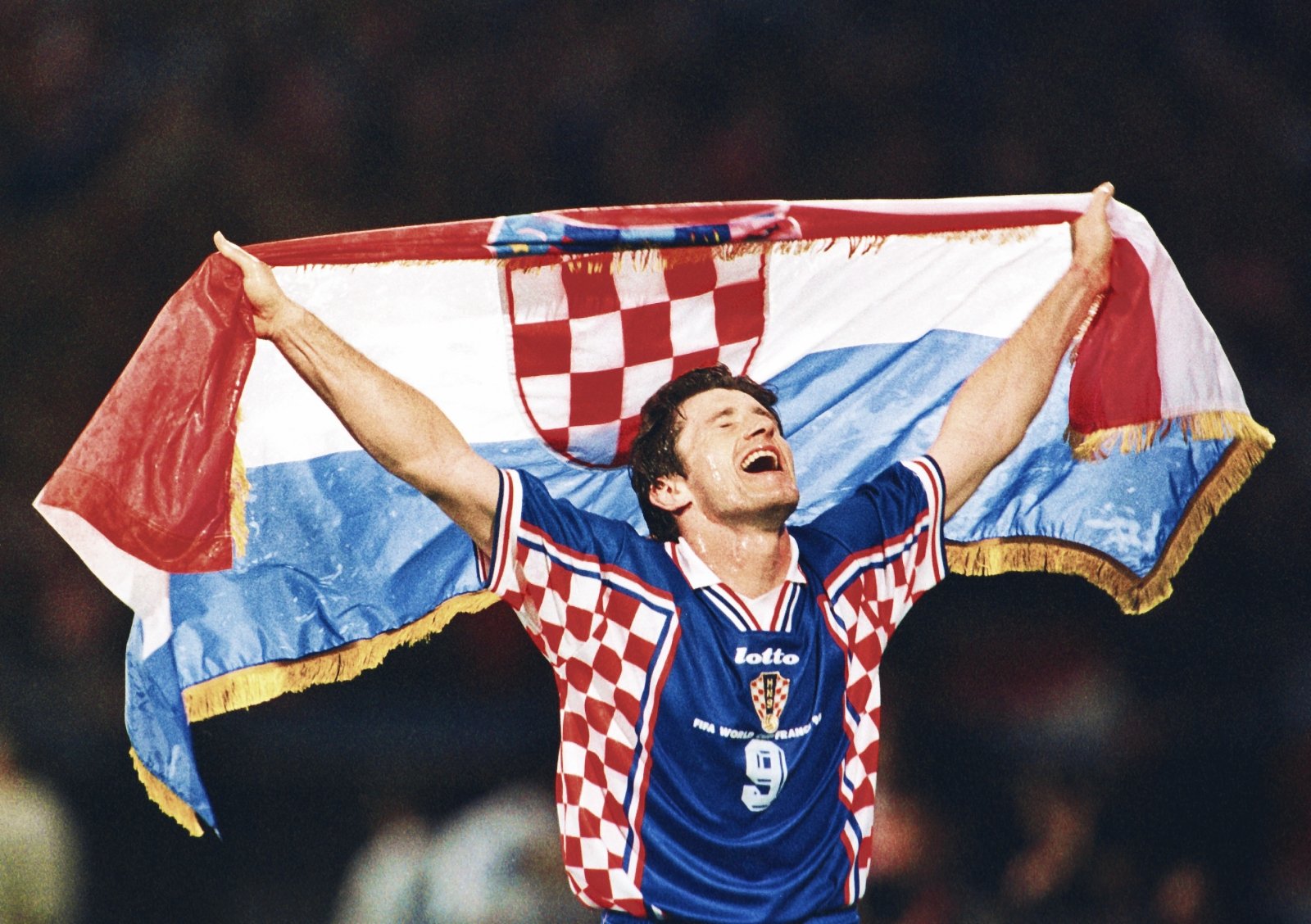There is one man who towers above the rest when it comes to the uncomfortable entwining of football and politics: Zvonimir Boban. The former AC Milan midfielder enjoyed a richly successful club career, which saw him lift four Scudettos with the Rossoneri, a Champions League and form part of the infamous Croatian national team that managed to defy the odds and finish third at the 1998 World Cup in France.
However to many, Boban is a symbol, not of footballing prestige, but of nationalism and Croatian freedom, for his now-legendary role in kick-starting the Croatian War of Independence. It is, of course, ridiculous to deduce that a footballer single-handedly prompted a conflict, but Boban’s particularly well-documented contribution to a raging riot between fans of Dinamo Zagreb of Croatia and Red Star Belgrade of Serbia in May 1990 took hostilities between Yugoslavia and the nationalist population of Croatia to dangerous new heights.
When telling the story of Boban and the kick that started a war, it is essential to provide the historical and political context and the extraordinary circumstances that provided such a heated backdrop to the match between Red Star and Dinamo.
The former Yugoslavia was formed as a nation at the end of the Great War, bringing together several groups of geographically proximate people including Croats, Serbs, Slovenes and Montenegrins. The mix of nationalities and identities were kept together under the unifying rule of one man: Marshal Tito.
The Yugoslav revolutionary and statesman was, for many, the ultimate symbol of unity, his policies maintaining the peaceful coexistence of the various nations of the Yugoslav federation. Tito was the chief architect of the second Yugoslavia, which lasted from 1943 to the early-90s when, after over a decade of escalated tension prompted by his death in 1980, the nation descended into a series of conflicts and unrests that would ultimately rip it apart.
During the 1980s, when Yugoslavia found itself at a crossroads following Tito’s death, football became a prominent means of expressing nationalism for Croatians. For many fans, the stadium became an arena for which they could vent their political and social frustrations. Chanting and singing, along with images on flags and banners, meant stadiums could often bear an overwhelmingly political atmosphere. And that was exactly the case on 13 May 1990 when Red Star faced Dinamo in a match that has regularly been referred to as one of the very few that changed the world.
Some Dinamo fans were fervently nationalistic and prepared themselves for a conflict to gain independence. The Dinamo fans group, the Bad Blue Boys, were the most passionate, with many of them joining the Croatian military, similarly to the Red Star ultras of Belgrade forming a sizeable chunk of the Serbian armed forces. So, in a stadium packed with hard-line nationalists and anti-government sentiment, and an atmosphere simmering with an unimaginably tense animosity, Dinamo and Red Star faced off. What followed is now widely regarded as the most atrocious example of hooliganism ever witnessed in European football.

The match was a prognostication of the war that was to follow, abandoned after just 10 minutes due to escalating scenes of violence. When all hell broke loose during a pitch invasion, Boban spotted a policeman trying to prevent Croatian hooligans from attacking the Red Star end. Overcome with nationalist pride and anger, the midfielder sprinted towards the officer and jumped into the air, launching his right knee into the face of his opponent.
After this, the fighting went on for more than an hour and the stadium was eventually set on fire in scenes of horrific scenes that shook the world. One of the haunting soundtracks of that day was Boban shouting, “Where is the police? Where is the bloody police?” He was referring, of course, to the lack of police action as the afternoon progressively blackened what should have been a great match of football.
“The hooligans from Belgrade were ruining our stadium. The police at the time, who were absolutely a regime police, did not respond at all,” Boban later noted in Vuk Janic’s documentary, The Last Yugolsav Football Team. It illustrated such an unbending courage and dedication to a cause that helps us think of Boban as more than merely a footballer. He is a national hero, a nearly mystical, romantic figure in the pantheon of footballing greats who commands respect for utilising his influential position as the captain of Dinamo Zagreb to fight for the Croatian cause.
Following that dark day inside the Maksimir stadium, when the police did nothing to stop the descent into chaos, many went to battle when the Croatian War of Independence began. One of the major actors in the conflict was Zelijko Raznatovic, more popularly known as Arkan – the Serbian career criminal and murderous paramilitary who became the commander-in-chief of the notoriously hardcore Red Star football fans known as the Delije.
Arkan had been there at the Maksimir, along with approximately 1,500 Delije, embroiling themselves in violent acts against the Croatians. Arkan would go onto form the Serb Volunteer Guard, a violent and intimidating militia group made up largely of the Delije. They became known as ‘Arkan’s Tigers’ and embarked on a reign of terror through the War of Independence until they eventually disbanded in 1996.
“Here I was, a public face prepared to risk his life, career and everything that fame could have brought, all because of one ideal, one cause; the Croatian cause.” Boban said after kicking the policeman
Boban’s flying kick could have led him down a much more uncertain path but, luckily for him, he went on to have a successful career as a professional footballer. As a tremendously gifted creative midfielder who was also noted for his versatility, the football scouts of Europe’s major clubs began filing excited reports on the Croatian. He was attracting admiring glances from several clubs but AC Milan won the race for his signature in 1991, capturing him in a deal believed to be worth around £8m.
It was a significant breakthrough for Boban, but he was forced to wait for his chance to shine at San Siro, being loaned immediately to Bari following his arrival in order to acclimatise to his new environment and surroundings in Italian football. Bari were ultimately doomed in the 1991/92 campaign, relegated to Serie B, but Boban was a standout figure throughout his spell there. While still undeniably raw, Boban exhibited his prodigious talents on a consistent enough basis to impress Fabio Capello back in Milan. As a result, the Croatian was recalled following Bari’s relegation and found himself with the enticing opportunity to mix it with the likes of Ruud Gullit, Roberto Donadoni and Demetrio Albertini.
Despite the illustrious stature of some of his team-mates, Boban was not to be fazed, improving steadily as he became a pivotal cog in Capello’s ultra-efficient, trophy-laden Italian football machine. Boban, a genuine box-to-box midfielder at the time, formed a near-impregnable partnership with Albertini in the middle of the pitch. It was the staple of a campaign that saw the defensively-minded Italians power through the Champions League towards a meeting with Johan Cruyff’s Barcelona in the final.
Although they were not entirely disregarded in the build-up, the Serie A outfit were widely expected to be outrun and outclassed by their brilliant Catalan counterparts, but AC Milan’s measure of control and utter dominance set the tone for one of the most memorable European cup finals in history.
Comprehensively dismantling one of the greatest teams ever assembled, Milan crushed Barca 4-0 after a display of utmost confidence and quality. Capello opted for a midfield partnership of Dejan Savićević and Boban, and it proved to be a masterstroke with the duo establishing a measure of control from the very outset. They have been referred to as Milan’s two Balkan warriors and their finest hour in Athens helped propel Milan to one of the greatest victories of all time.
For Boban, it was a hugely emotional night, coming just four years after that harrowing riot. Politics and football were undoubtedly married in discomfort throughout Boban’s career but he refused to let his passionate alignment with Croatian nationalism stand in the way during his ascent to the highest echelons of the game.
Boban and his Rossoneri team-mates were not prepared to rest on their laurels, however, and the set about continuing a dominance in the Italian club scene. A further Scudetto triumph followed their Champions League success in 1996 and 1999, when Boban flourished as a player with enhanced responsibilities due to his seniority. He continued to excel under the tutelage of Alberto Zaccheroni just as he had under Capello, winning his final league title in 1999 as a leader of the Milan squad. It was a quality that marked him out from many of his peers; he always upheld a confrontational, aggressive style of play but he was never a hatchet man. He had genuine technical quality and supplemented it with having the heart of a lion, which made him the consummate competitor.

Boban’s international career had its ups and downs too. For his karate-kick on the policeman in 1990, he was punished by the Yugoslavian FA and suspended from the national team for six months, resulting in him missing Italia 90.
Boban would get the chance to show his worth on the global stage eight years later when he formed an important part of one of the great cult World Cup teams in the competition’s history. Croatia finished third at France, defeating Netherlands in the third-place playoff after going out to eventual champions France in the semi-final.
Alongside the glorious goalscoring exploits of Davor Šuker – who finished the tournament with a Golden Boot for his unmatchable prowess in front of goal – as well as an immensely talented squad featuring the likes of Slaven Bilić, Igor Štimac, Dario Šimić, Robert Prosinečki and Aljoša Asanović, Boban once again made himself a national hero. Boban was the captain and on-field general, inspiring his side as they came through a group containing Argentina, Japan and Jamaica, while successfully negotiating their way through a last-16 tie with Romania and quarter-final against Germany.
Although the defeat to France in the semis was painful, the tournament was another period of gratification for Boban. The 90s as a decade started off in rather bleak circumstances for Boban but, by the turn of the millennium, he was able to call himself a four-time Serie A champion, a Champions League winner and the man who led his country to their finest hour the World Cup. Naturally, Boban’s career wound down as he reached the latter stages and when Rui Costa was signed for Milan from Fiorentina, it marked the end of an era for Boban who, after nine seasons as a hero of the San Siro, departed the club for Celta Vigo on loan.
Unfortunately it didn’t work out for the midfielder in Spain as he managed only four appearances, but Boban wasn’t done there. His footballing career may have been coming to a close, but he decided to explore other avenues in life, avenues that many footballers would not dare go down. After hanging up his boots, Boban completed a history degree, writing his thesis on Christianity in the Roman Empire.
Always known as a voracious reader, Boban’s intellectual pursuits and leanings help him stand out among many footballers. He remains a prominent figure in Italian football, regularly writing columns for Gazzetta dello Sport and working as a pundit and analyst for SKY Italia. His uncompromising comments and style of punditry have often mired him in controversy since he began his second career but he says it as he sees it. Boban was never a man to shy away from something and was certainly never a man to hide his feelings.
Boban remains a symbol of Croatian nationalism and a hero for AC Milan. He deserves to be remembered as much more than merely a sportsman who helped set in motion a bitter conflict after kicking a policeman. He was also a fantastic footballer. Brilliantly creative, with a penchant for the odd spectacular goal, Boban forged an excellent career for himself and formed an integral part of one of the greatest club sides of all time.
